过去分词做宾补及练习
全国卷高考英语总复习-过去分词做宾补(最新)
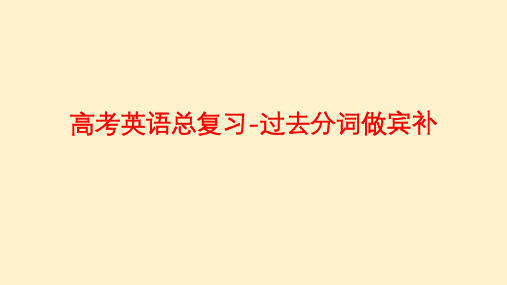
on a bus last month.(steal)
上个月,我姐姐的钱包在公共汽车n 上被偷了。
to do sth. 使……做某事主动 get+宾语+doing sth. 使……开始做某事主动
done 使……被做被动
He got me to post the letter for him. 他让我替他寄信。 The captain got the soldiers moving toward the front after a short rest. 休息了片刻之后,上尉让士兵们开始朝前线行进。 I'll get my cellphone repaired tomorrow. 我明天要(请人)修一下我的手机。
doing sth.听到……正在做……主动、
进行
hear+宾语+do sth.听到……做了……主动、完成
done 听到……被做被动、完成或无
时间性
I heard her singing an English song when I passed by her room yesterday. 昨天经过她房间时,我听见她正在唱英文歌。(主动、正在进行) I heard her sing an English song just now. 刚才我听见她唱了一首英文歌。(主动、完成) To learn English well, we should find opportunities to hear English spoken as much as possible. 为了学好英语,我们应该尽可能多地听英语。(被动、无时间性)
• 经理要求在本周末完成这项工作。 • 5.过去分词用在“with+宾语+宾补”这一结构中,过去分词与宾语
done作宾补的例句

done作宾补的例句在英语中,"done"作为动词的过去分词形式,通常用作宾语补足语(宾补),表示动作已经完成。
以下是一些使用"done"作为宾补的例句。
1. I have finished the report that was assigned to me.我已经完成了分配给我的报告。
2. She has seen the movie that everyone is tal king about.她已经看了大家都在谈论的那部电影。
3. They have cleaned the house from top to b ottom.他们已经把房子从上到下都打扫干净了。
4. He has eaten the sandwich he brought for l unch.他已经吃掉了带来的午餐三明治。
5. We have completed the project on time and within budget.我们已经按时并且按照预算完成了项目。
6. She has read the book that was recommend ed by her teacher.她已经读了她老师推荐的这本书。
7. They have fixed the computer that was brok en.他们已经修好了那台坏掉的电脑。
8. I have written the letter to the editor that I promised to do.我已经写了我答应要写的给编辑的信。
9. He has learned the new software that is nec essary for his job.他已经学会了工作中必要的新软件。
10. We have sold the old car that was taking up space in the garage.我们已经卖掉了占用车库空间的那辆旧车。
必修5 unit2 语法 :过去分词作宾语补足语
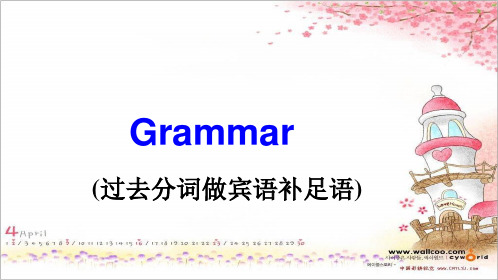
=They were made to work the whole night.
使役动词和感官动词 等作宾补, 省略to。 注意: 在被动语态中则to不能省掉。 1. I make her wait for an hour to wait She was made _________(by me)for an hour. 她被迫等了一个小时。 •2. I saw him dance. to dance •He was seen __________(by me).
•I saw them _______( robbed
) by two men.
I saw him _______ blamed blame by his mother
(被他妈妈责备)
I saw him ______ bitten bite by a dog. (被一只狗咬了)
I saw him ______(beat)by beaten his mother
1. With all the problems_______(solve), he felt relaxed. solved (过去) going 2. With all the noise_______(go) on, I couldn’t concentrate on my study.(现在)
• 下列各句均有一处错误,请指出并改正。 •1. I found the game excited. exciting •2. We usually work only five hours a day, so we have plenty of spare time visit the area and have fun.
cut
clean repair wash
语法详解:过去分词作宾补
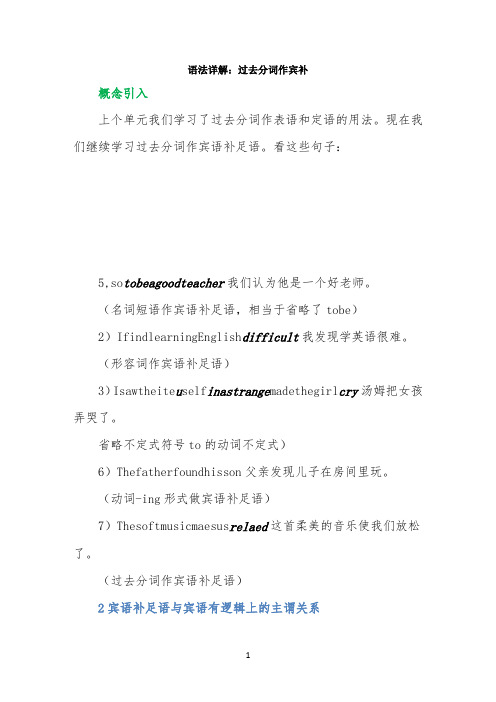
语法详解:过去分词作宾补概念引入上个单元我们学习了过去分词作表语和定语的用法。
现在我们继续学习过去分词作宾语补足语。
看这些句子:5,so tobeagoodteacher我们认为他是一个好老师。
(名词短语作宾语补足语,相当于省略了tobe)2)IfindlearningEnglish difficult我发现学英语很难。
(形容词作宾语补足语)3)Isawtheite u self inastrange madethegirl cry汤姆把女孩弄哭了。
省略不定式符号to的动词不定式)6)Thefatherfoundhisson父亲发现儿子在房间里玩。
(动词-ing形式做宾语补足语)7)Thesoftmusicmaesus relaed这首柔美的音乐使我们放松了。
(过去分词作宾语补足语)2宾语补足语与宾语有逻辑上的主谓关系1)TheynamedtheblacdogArrow他们命名这只黑狗“Arrow”。
(我们可以说“ThelittledogisArrow”,所以宾语thelittledog和补足语Arrow是逻辑上的主谓关系。
)2)Inoticedalittlegirldrawingunderthetree我注意到一个小女孩在树下画画。
(小女孩在画画,即宾语补足语的动作是女孩做的,宾语与补足语是逻辑上的主谓关系,而且是主动的,用动词-ing形式作宾语补足语)3)Weshouldeeinformedofwhatisgoingonhere我们必须让他了解这里发生的事。
(他被告知某事,说明宾语“他”与补足语“告知”是被动的主谓关系,也称为“动宾关系,即动词及其宾语的关系”,用过去分词作宾语补足语)3主语补足语含有宾语补足语的句子变成被动句时,原来的宾语补足语就变成了主语补足语。
Hewasfound slee ewithcuriosity我看见他的眼睛盯着我,充满了好奇。
解析:过去分词fied的用法是易错处。
初中英语过去分词作宾语补足语精讲
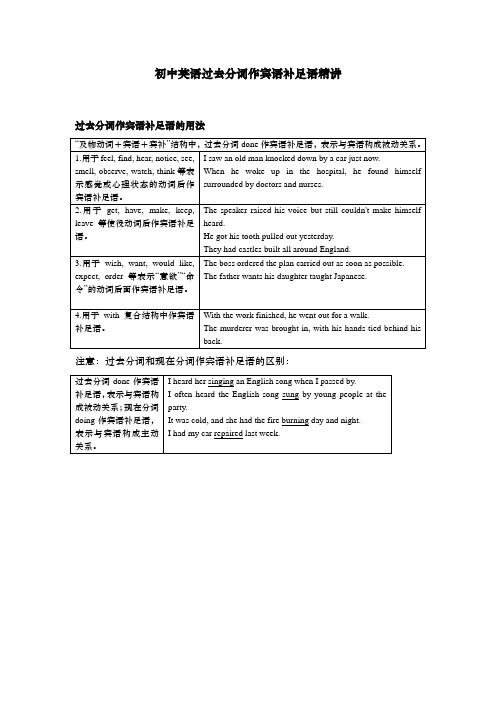
注意:过去分词和现在分词作宾语补足语的区别:
过去分词done作宾语补足语,表示与宾语构成被动关系;现在分词doing作宾语补足语,表示与宾语构成主动关系。
I heard hersingingan English song when I passed by.
The boss ordered the plan carried out as soon as possible.
The father wants his daughter taught Japanese.
4.用于with复合结构中作宾语补足语。
With the work finished, he went out for a walk.
The speaker raised his voice but still couldn't make himself heard.
He got his tooth pulled out yesterday.
They had castles built all around England.
3.用于wish, want, would like, expect, order等表示“意欲”“命令”的动词后面作宾语补足语。
I often heard the English songsungby young people at the party.
It was cold, and she had the fireburningday and night.
I had my carrepairedlast week.
过去分词作宾补
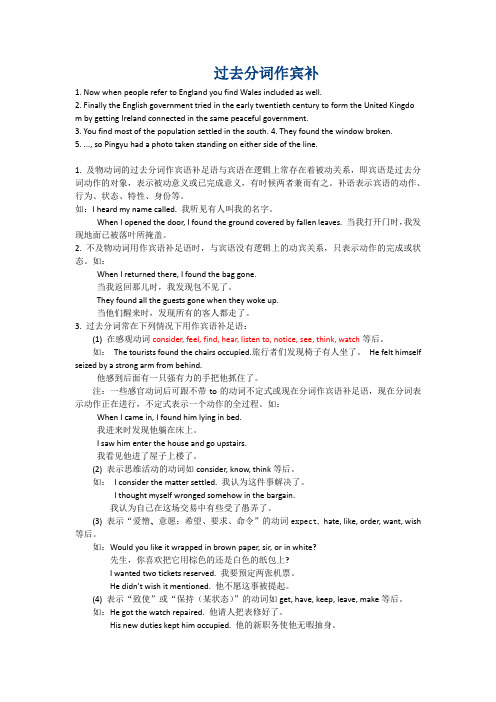
过去分词作宾补1. Now when people refer to England you find Wales included as well.2. Finally the English government tried in the early twentieth century to form the United Kingdom by getting Ireland connected in the same peaceful government.3. You find most of the population settled in the south.4. They found the window broken.5. ..., so Pingyu had a photo taken standing on either side of the line.1. 及物动词的过去分词作宾语补足语与宾语在逻辑上常存在着被动关系,即宾语是过去分词动作的对象,表示被动意义或已完成意义,有时候两者兼而有之。
补语表示宾语的动作、行为、状态、特性、身份等。
如:I heard my name called. 我听见有人叫我的名字。
When I opened the door, I found the ground covered by fallen leaves. 当我打开门时,我发现地面已被落叶所掩盖。
2. 不及物动词用作宾语补足语时,与宾语没有逻辑上的动宾关系,只表示动作的完成或状态。
如:When I returned there, I found the bag gone.当我返回那儿时,我发现包不见了。
They found all the guests gone when they woke up.当他们醒来时,发现所有的客人都走了。
3. 过去分词常在下列情况下用作宾语补足语:(1) 在感观动词consider, feel, find, hear, listen to, notice, see, think, watch等后。
串讲07过去分词作定语宾补表语和状语及必刷题(原卷版)
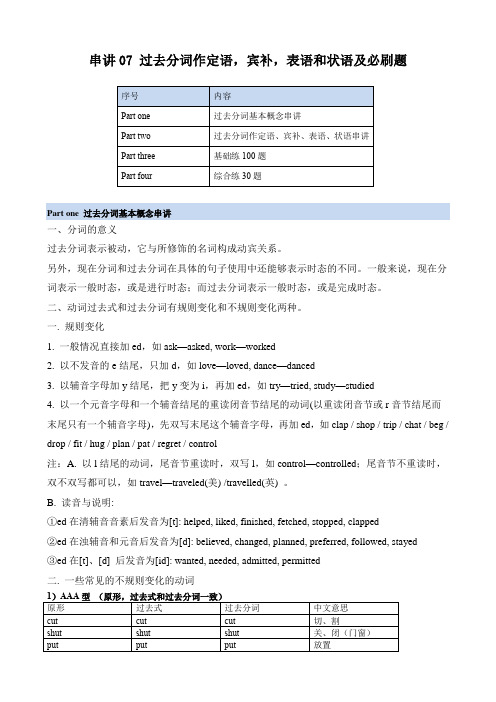
串讲07 过去分词作定语,宾补,表语和状语及必刷题Part one 过去分词基本概念串讲一、分词的意义过去分词表示被动,它与所修饰的名词构成动宾关系。
另外,现在分词和过去分词在具体的句子使用中还能够表示时态的不同。
一般来说,现在分词表示一般时态,或是进行时态;而过去分词表示一般时态,或是完成时态。
二、动词过去式和过去分词有规则变化和不规则变化两种。
一. 规则变化1. 一般情况直接加ed,如ask—asked, work—worked2. 以不发音的e结尾,只加d,如love—loved, dance—danced3. 以辅音字母加y结尾,把y变为i,再加ed,如try—tried, study—studied4. 以一个元音字母和一个辅音结尾的重读闭音节结尾的动词(以重读闭音节或r音节结尾而末尾只有一个辅音字母),先双写末尾这个辅音字母,再加ed,如clap / shop / trip / chat / beg / drop / fit / hug / plan / pat / regret / control注:A. 以l结尾的动词,尾音节重读时,双写l,如control—controlled;尾音节不重读时,双不双写都可以,如travel—traveled(美) /travelled(英) 。
B. 读音与说明:①ed在清辅音音素后发音为[t]: helped, liked, finished, fetched, stopped, clapped②ed在浊辅音和元音后发音为[d]: believed, changed, planned, preferred, followed, stayed③ed在[t]、[d] 后发音为[id]: wanted, needed, admitted, permitted二. 一些常见的不规则变化的动词Part two过去分词作定语、宾补、表语、状语串讲一、过去分词作定语1.过去分词作定语时的位置(1)前置定语一般情况下,单个过去分词作前置定语,即放在所修饰词之前。
人教版高中英语【必修五】[语法讲解 过去分词作宾语补足语

人教版高中英语必修五知识点梳理重点题型(常考知识点)巩固练习过去分词作宾语补足语概念引入上个单元我们学习了过去分词作表语和定语的用法。
现在我们继续学习过去分词作宾语补足语。
看这些句子:1. Now when people refer to England you find Wales included as well.2. Finally the English government tried in the early twentieth century to form the UnitedKingdom by getting Ireland connected in the same peaceful government.3. You find most of the population settled in the south.4. They found the window broken.5. ..., so Pingyu had a photo taken standing on either side of the line.这些句子中的黑体部分都是过去分词作宾语补足语。
用法讲解宾语补足语是同学们学习英语的一个小难点,许多同学都弄不清到底什么是宾语补足语,它的作用是什么,所以我们今天就从宾语补足语讲起,重点讲解过去分词作宾语补足语的内容。
什么是宾语补足语英语中一些动词除需要一个宾语外,还需有宾语补足语句子意义才完整,这样就构成了英语的六种基本句型(见【补充】)中的“主语+谓语+宾语+宾语补足语”句型。
宾语与宾语补足语之间在逻辑上是主谓关系。
可作补足语的结构有名词、形容词、副词、介词短语、动词-ing形式、过去分词、不定式等。
宾语和其宾语补足语也被称为复合结构。
1. 作补足语的词语:1)We consider him (to be) a good teacher. 我们认为他是一个好老师。
- 1、下载文档前请自行甄别文档内容的完整性,平台不提供额外的编辑、内容补充、找答案等附加服务。
- 2、"仅部分预览"的文档,不可在线预览部分如存在完整性等问题,可反馈申请退款(可完整预览的文档不适用该条件!)。
- 3、如文档侵犯您的权益,请联系客服反馈,我们会尽快为您处理(人工客服工作时间:9:00-18:30)。
过去分词作宾补用法归纳英语中过去分词可作宾补,(此时的过去分词一般是及物动词)表被动意义或完成意义,有时两者兼而有之。
做宾补的过去分词与宾语有逻辑上的动宾关系,即宾语是过去分词动作的对象。
如:She found the door broken in when she came back. (宾补与宾语有被动的关系,表一种状态。
)一.过去分词用在表状态的动词keep, leave等的后面。
eg: They kept the door locked for a long time.Keep your mouth shut and your eyes open. (谚语:少说多看)Don't leave such an important thing undone.Don't leave the windows broken like this all the time.二.过分词用在get, have, make 的后面。
1. 注意“have +宾语+过去分词”的两种情况:A)表"让某人做某事/让某事(被人)做"eg: I have had my bike repaired.The villagers had many trees planted just then.B)表"遭遇到某种不幸,受到打击/受. . . . 影响,蒙受. . . . . 损失" eg: I had my wallet stolen on a bus last month.The old man had his leg broken in the accident.He had his leg broken in the match yesterday. (MET1986)2. "make+宾语+过去分词",在这种结构中,过去分词的动词必须是表示结果含义的。
如:They managed to make themselves understood in very simple English.I raised my voice to make myself heard.三、过去分词用在感观动词watch, notice, see, hear, listen to, feel, find 等后面。
如When we got to school, we saw the door locked.We can hear the windows beaten by the heavy rain drops.He felt himself cheated.The managers discussed the plan that they would like to see carried out the next year. (NMET2000)四、过去分词用在want, wish, like ,expect等表示“希望,愿望”这一类动词后面做宾补。
如The boss wouldn't like the problem discussed at the moment.I would like my house painted white.I want the suit made to his own measure.I wish the problem settled.五、过去分词用在“with +宾语+宾补”这一结构中,过去分词与宾语之间是动宾关系。
如:The thief was brought in with his hands tied behind his back.With many brightly-colored flowers planted around the building ,his house looks like a beautiful garden.With everything well arranged, he left the office.六、过去分词、现在分词、和不定式作宾补的区别。
现在分词作宾补:宾语和补语之间是主谓关系。
其动作与谓语动作同时进行。
过去分词作宾补:宾语和补语之间是动宾关系。
其动作先于谓语动作。
不定式作宾补:表一个完成的动作、或表一个很短时间内看到、听到或感觉到的具体动作。
eg: He didn't notice me waiting.I heard the song sung in English.I saw him opening the window.I saw the window opened.I saw him open the window.I heard her sing the song in English. </P< p>专项训练1:1. ___ poor at English, I'm afraid I can't make myself ___.A. To be; understandB. I'm ;to understandC. Being ;understandingD. Being; understood2. I have had my bike ___ ,and I'm going to have somebody ___ my radio tomorrow.A. repair; to repairB. repairing; to be repairedC. repaired; repairD. to repair; repairing3. You must get the work ___ before Friday.A. doB. to doC. doingD. done4. ___ the room, the nurse found the tape-recorder ___.A. Entering; stealingB. Entering; goneC. To have entered; being stolenD. Having entered; to be stolen5. We are pleased to see the problem ___ so quickly.A. settledB. having been settledC. be settledD. settling6. Mrs. Brown was much disappointed to see the washing machine she had had ____ went wrong again. (上海1999)A. itB. it repairedC. repairedD. to be repaired7. It is wise to have some money ___ for old age. (NMET1996)A. put awayB. keep upC. give awayD. laid up (put away 放好, 储存. . . 备用, 处理掉, 放弃, 抛弃)8. I don't want the children ___ out in such weather.A. takeB. to takeC. takenD. taking9. I'm afraid that I can't make myself ___ be cause of my poor English.A. understandB. understandingC. to understandD. understood10. The murderer was brought in, with his hands ___ behind his back.A. being tiedB. having tiedC. to be tiedD. tied (表动作完成)专项训练2:1. We found her greatly ___.A. improvingB. changedC. to helpD. having disturbed2. Jane got her bad tooth ___ at the dentist's.A. to put inB. pulled outC. pushed outD. drawing out3. When ____ ,the museum will be open to the public next year. (上海2002)A. completedB. completingC. being completedD. to be completed4. With a lot of difficulties ___ ,they went to the seashore and had a good rest.A. settledB. settlingC. to settleD. being settled5. The research is so designed that once ___ nothing can be done to change it. (NMET2002)A. beginsB. having begunC. beginningD. begun( once begun 在句中作状语,begin为及物动词:“着手”)6. ___ ,they went home,___.A. Their work had been finished; singing and laughingB. They had finished their work; sang and laughedC. Their work finished; singing and laughingD. after their work finished; singing and laughing7. Before he came to London, he had never heard a single English word ___A. speakingB. speakC. spokenD. to speak8. ____ more attention, the trees could have grown better.A. GivenB. To giveC. GivingD. Having given9. ___ from space, the earth with water ___70% of its surface looks like a "blue blanket".A. Seen ;coveredB. Being seen; coversC. Seeing; coveringD. Seen; covering10. ____,the experiment will be successful.A. If carefully doingB. If it done carefullyC. If carefully doneD. If doing carefully11. The girl wrote a composition without ___.A. askB. askingC. being askedD. to be asked12. He finished his homework and then went on ___me.A. helpingB. with helpC. with helpingD. to help13. ___where to go ,he asked a policeman.A. Having lost his way and not knowingB. Losing his way and didn't knowC. Having lost his way and didn't knowD. Lost his way and didn't know14. ____ her friend was badly hurt, she burst into tears.A. HearingB. Having heardC. To hearD. Heard15. ____ his team had won, his face lit up at once.A. KnowingB. When knowingC. After knowingD. When he knew专项训练3:1. They hurried back home only to find their house ___ into.A. breakB. to breakC. brokenD. breaking2. When he came to, he found himself ___ on a chair, with his hands ___ back.A. to sit; tiedB. sitting; tyingC. sat; tiedD. sitting; tied3. We do not feel ___ to enter modern buildings; everything about them seems unfriendly.A. invitedB. invitingC. to inviteD. to be invited(feel后加形容词,此处的invited 表主语we 的感受)4. I'm going to have my letters ____ tomorrow if I've got them ready by then.A. to typeB. typeC. typedD. typing5. Every great culture in the past had its own ideas of beauty ___ in art and literature.A. expressedB. to expressC. being expressedD. to be expressed答案:专项训练1:1-10 DCDBA CACDD专项训练2::1-15 BBAAD DDADC CDDAD专项训练3::1-5 CDACA。
